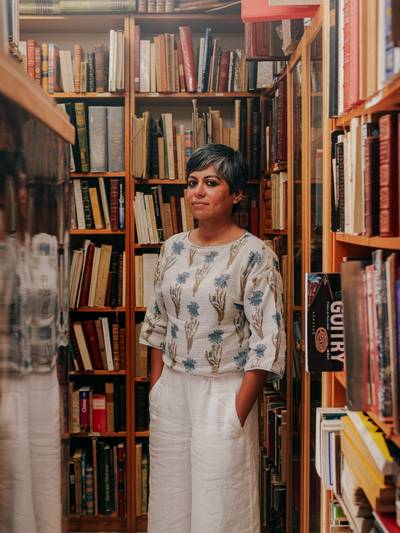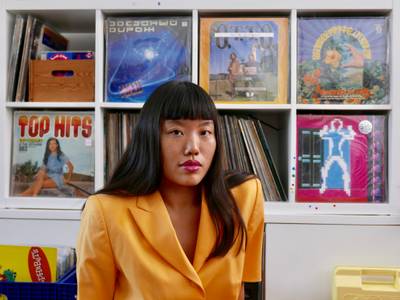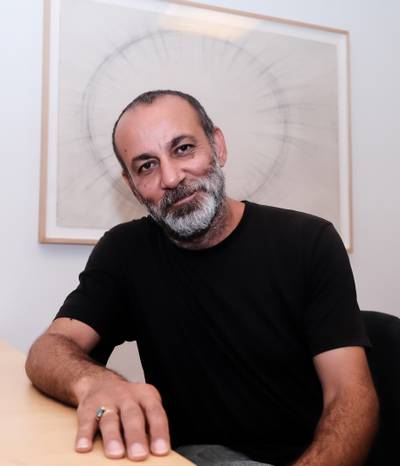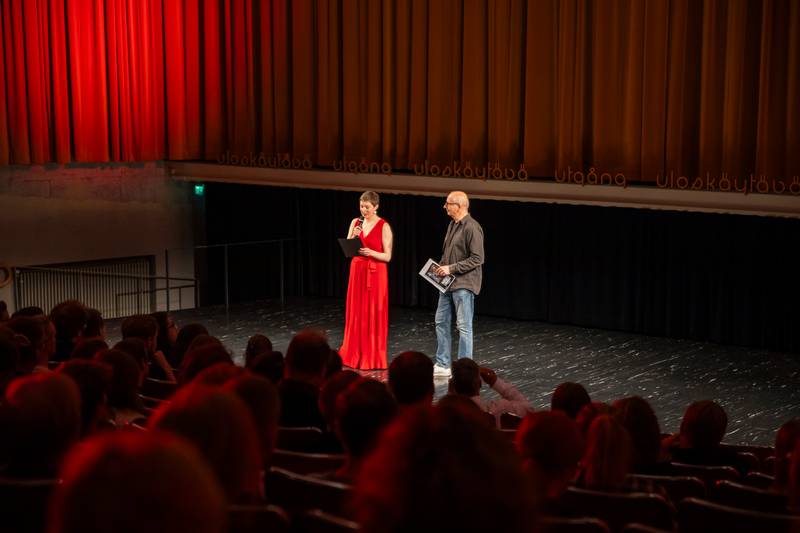

Anna Möttölä and Pekka Lanerva at the Love & Anarchy Film Festival
Elham Rahmati (b. 1989, Tehran) is a visual artist and curator based in Helsinki. She is the co-founder and co-editor of NO NIIN. In 2019 and 2020, she worked as the curator and producer of the Academy of Moving People & Images (AMPI), a film school in Helsinki for mobile people.
Helsinki International Film Festival (HIFF) a.k.a. Love & Anarchy (L&A), is, to me, the most thrilling event of the year. When the programme is released, I begin my ritual of carefully going through the films to select ones that pique my interest, and there are plenty. Over the years, L&A has made a point of showcasing many films from queer cinema as well as countless films from women filmmakers in Finland and internationally, making it a great example of a festival not only following but also defining trends. Could it do even better? Absolutely. In my observation, L&A has actively tried to do just that, something that I believe hasn’t gone unnoticed by audiences who love the festival so much that many of them joined in last fall to attend fundraising screenings that were organised to make sure we’d have a festival next year despite the ruthless austerity measures of the current government that has next to no regard for art and culture (and workers and immigrants and students, I could go on.)
I met Anna Möttölä in early April, not long after she finished her seven-year term working as the executive director of L&A. Before that, I had mainly seen her introduce some of the films at the festival or lead some of the Q&As with filmmakers. In all that, something that shined through so clearly was how much she loves cinema and that, for her, this is not merely another job. I admire this quality, as I find it quite rare these days in people with higher institutional positions. Among the many things we discussed were what this job meant to her, the decision to leave it, the challenges and learning curves of the job, L&A as a political institution, and the struggles of running a festival in times of austerity.
ELHAM: I want to start with a cliche question and expect a non-cliche answer. You just finished a 7-year term at a job that everyone can clearly tell you loved and were great at. How do you feel about what you accomplished in these years? What did this job mean to you on a personal level?
ANNA: This was a dream job for me. I loved it a lot. Really, a lot. My decision to leave now wasn’t sudden. I already started to think about it when I started seven years ago. I had been involved with the festival previously, doing volunteer jobs, writing for the catalogue, etc. So overall, I’ve been with the festival for ten years in different capacities. When I started, I was mindful that this is a job that gives you a lot but also demands a lot, so there should be a limit. It is precisely because I love it so much and I appreciate it so much that I made sure to be conscious to leave before it gets too dull or taxing or that I feel I’m not getting more out of it than I’m giving, because that can happen over time regardless of how much you love a job. I also wanted to hand the job over so that other people would have the chance to take the lead.
I learned a lot in this position about film, about the film industry, and the festival and event industry, not just in Finland but internationally. But most of all, about people. When I went in, it was very much for the film; that was what I was interested in and had things to say. But quite quickly, I realised that most of this job is about the people—different audiences, the people you work with and collaborate with within your own team and in your organisation—and then all the other collaborators that the organisation works with, and that becomes the most rewarding thing. We often wondered, with the artistic director, Pekka Lanerva, who was one of the founders of Love & Anarchy and has been with the festival for over 30 years, and shared this feeling that you never fail to wonder, how do these wonderful, talented people somehow always find their way to this festival and want to give it something?
This job was hard many times, and you had to work long hours many times. There are a lot of things you have to solve as they come up, and there’s a pandemic and difficult financial situations, but despite all that, it was just really the best thing.
Decision-making positions, although offering a lot of possibilities and freedoms, can bring a lot of different challenges and conflicts with them. Is there a certain difficult situation that you had to navigate during your years in this position that you learned a lot from?
There’s always a learning curve with every job. In the earlier years, you are younger and have a lot of urge to improve in many ways in terms of, for example diversity or accessibility, and then you can rush into things. There, you learn that you have some more work to do, even though you thought that you had done the work. There are things now that I would do differently, I would present a programme, a subject or a person differently, involve a different kind of network in dealing with a subject, etc. A lot of things have changed in the past decade, and many important conversations have been brought up through movements like Me Too, Black Lives Matter, etc. We have to have humility and courage to say that the way we were doing things before was not working in the best way, so what can we do now? We have to learn to change and adapt to new ways of doing things, and we don’t have to do that on our own but through collaborations with people who know more about a topic than we do.
Another thing is that before I started, I didn’t have so much experience being a boss to other people. Everyone has been patient, learning together how to manage a team, what people need, and what the differences are between people. The more diverse the team becomes, the more different situations in life they have. How do you manage those? It’s been important to keep the dialogue going instead of becoming defensive about things.
I attended Urban Apa’s feminist leadership platform during COVID. There, we talked a lot about what it’s like to run an egalitarian feminist organisation and how there is always the danger of having hidden hierarchies, which can be damaging. Starting out, it was clear in my title that I was the boss. But somehow, I was like, okay, these are my friends, and we can do this as a friendship kind of thing. It’s safe to say this approach doesn’t work. People need to know what everyone is responsible for. Otherwise, people can end up feeling that they are responsible for things they are not paid for. I realised that I was not doing anyone any favours by shrinking my own responsibilities and authority in the name of friendship.
L&A, unlike the majority of Finnish institutions, seems not to refrain from appearing political. That’s already apparent from the word “Anarchy” in the title. How do you define being political in the context of a film festival? Is it about trying to always “be on the right side of history”? If that is the case, how do you decide which side that is? Film or art institutions, especially if they receive public funding, despite their claim to freedom of expression, tend to follow the governing state ideology at large. Has this been the case with L&A throughout the years? Or have you, as a director, felt you could express your independent political opinion and make decisions that spoke to your own politics?
Love & Anarchy has always been a political organisation. Consuming films, making films, selecting films, presenting films and organising events around films can never be apolitical. Film, like any other medium in art, is political, no matter what it is about. It doesn’t have to be just a documentary film about a current issue; even if it’s fiction, it is always political. Our mission is to celebrate films, to present them in as many forms and traditions and from as many different parts of the world. At the same time, we wanted to serve as a place of coming together, to provide a meeting place where you can learn something new and experience something wonderful or horrible together, even if you don’t talk to other people. It doesn’t take anything away from a film’s artistic value to call it political. It’s okay to watch a film and just want to be entertained, but we have to understand everything we do in life is political, in the sense that we live in a society and films are produced in a society by people who come from different positions, from different socioeconomic classes, with different access levels to education, etc. It’s also important to know what stories are told, who gets to tell them, how they are analysed, and who they are consumed by.
Our mission is not to somehow twist the message of the films. We are there to present the films and the ideas of filmmakers, some of whom we don’t always agree with. We have to be aware that if we present a film, it can start a discussion. Some may say this was not a correct representation, that it didn’t tell the truth, or that it was somehow even hurtful. And that can be a scary thing because, of course, we don’t have knowledge about everything. There are 140 feature films presented every year. We watch or go through at least 2000 films in some capacity and discuss them. We have to think about programming and political approaches to be aware of what we are looking at and where we are looking at the film from.
There are certain platforms where we look for films. There are big festivals like Cannes and Berlin. So there’s already a filter there. And then, we look at many smaller places, and we try to find out as much as possible. It is true that, for example, films screened about the “Global South” that receive international recognition are very much about stories of suffering. This was the case with LGBTQ stories for a long time. We try to be conscious that not all of our films represent this sort of storyline. We’ve been working for some years with Think Africa and Ubuntu Film Club on the ‘African Express’ series and have discussed these questions of narratives and styles with them a lot. We collaborate with many cultural institutions from around the world, with embassies, with cultural organisations, and with groups working in Helsinki. I think it’s not that only this person, who is from this class or this group, can tell this story. There are many ways, but then you have to be mindful of the issues that come up when someone else tells the story.
I think you have to make sure that person understands that struggle and through which lens. You don’t need to have experienced the exact same struggle, but a person who has never understood or even observed oppression would have a very difficult time representing them from a place of solidarity and not exoticisation or savourism. Most mainstream festivals don’t take this into consideration.
It is very difficult. As a film festival, you want to screen all kinds of films. You want to screen the films that are talked about and rewarded. Sometimes, they are following a certain festival trend. It’s not a candy shop; when you do the programme, you can’t say, okay, these are all the films in the world, and now we can just pick and choose what we want. You have to think about many different things, and many issues affect whether a film is even available to screen at your festival or not. We are serving the film loving community in Helsinki, and if they are interested in what was revealed in the films that were awarded at Cannes, for example, we want to screen those as well because they are often very interesting and diverse films. And then you want to screen some other supplements that may be discovered at other smaller festivals. But I agree that, at least, the goal should not be to reproduce the programmes of other festivals.
The Western viewer also has a responsibility to be critical in questioning the stories that are brought to them from elsewhere. Films are a way of learning, so what are you learning? Who are you, and from what position are you watching the film? If you have a platform or you have power, you have to recognise that power. There used to be a thinking that equated giving a platform to someone with giving them a voice, and that’s such a patronising way of looking at people. We have to recognise diversity and make space for it to be able to reach out and be willing to learn and discuss together.
There are thousands of films made every year in the world, so we only present a small slice. In presenting films from different countries, there are quite often films that are just made for the domestic audience and some that are made for film experts. Sometimes, films find their way abroad and find recognition from experts there.
I think more often than not, the most interesting films are the ones that are made for the domestic audience.
Yes, but if the audiences in your country don’t know anything about it, then you are screening just for empty seats.
That’s exactly where I think film festivals can take one step ahead and nudge their viewers towards reorienting their approaches when it comes to finding out about cinemas outside of their own. I understand your point about having to make sure there is an audience for a film. How do you reach diverse audiences? How do you make sure that you are not screening films only for, let’s say, the Finnish middle/middle-upper class?
That’s continuous work we have to do. For sure, most of our audience is of a certain age and education—mostly women from 24 to 45 from the Helsinki region. We can always say that everyone is welcome to buy a ticket and join, but if certain groups are always absent from the seats, then I’d say that’s unhealthy. So I think it’s just a lot about learning. I don’t have a magical recipe.
‘African Express’ is already a great initiative of L&A in opening up to other communities.
Yes, it’s a lot about collaborating with different organisations, communities and media. We have to be conscious of the way our communication works. Is the language inclusive? How much are the ticket prices? Where are we screening? Are they in spaces where people feel that they are welcome? And if not, can we do something about it? You don’t always succeed in these collaborations either; sometimes, the discussions go nowhere. It’s important not to panic and think that only if/when you are perfect can you start doing everything; you have to accept that it won’t always go well. We can’t scare ourselves into not taking steps only because there might be a backlash. There are many things that we have been able to do right. Many communities and organisations are willing to collaborate with us, and I think that’s a sign of trust.
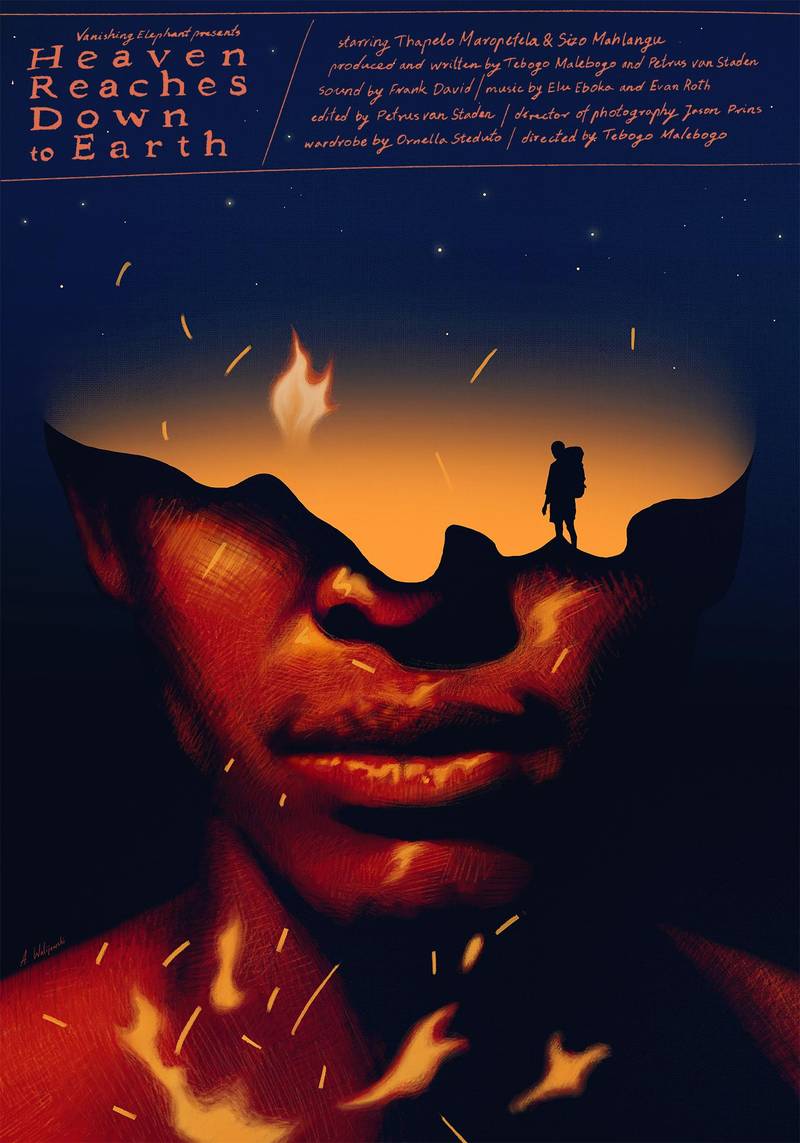

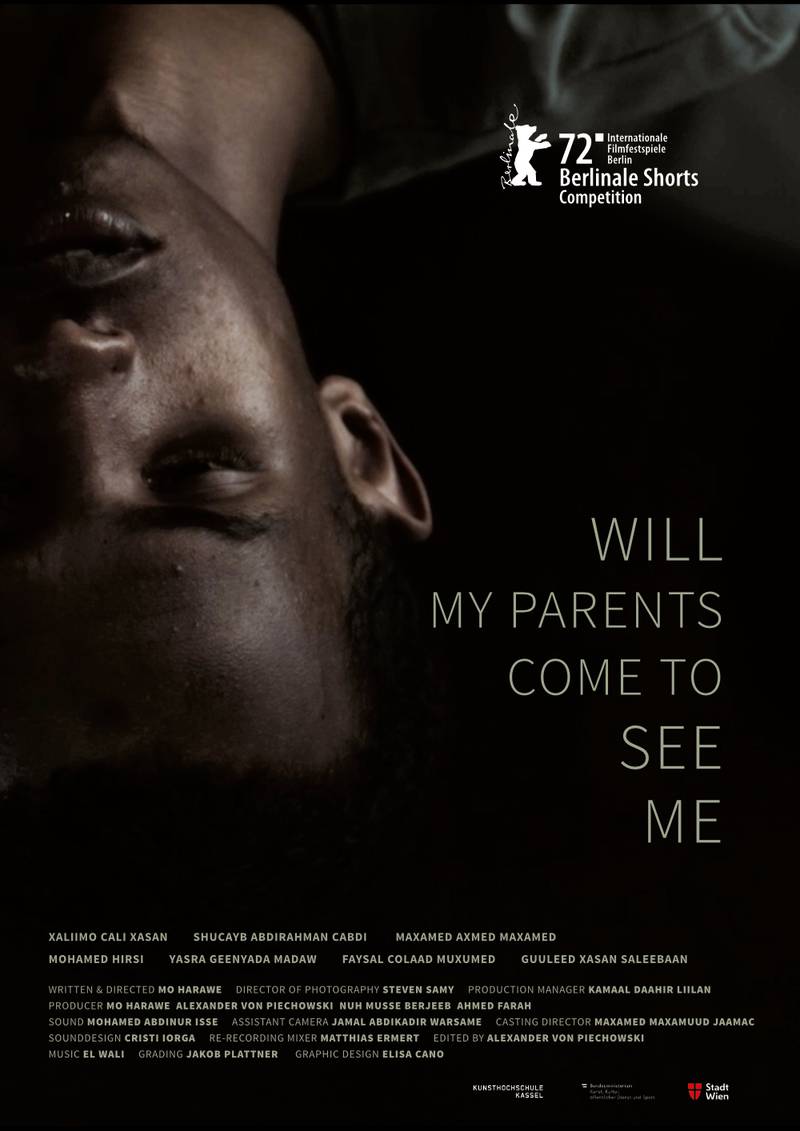

Poster for the short film ‘Heaven Reaches Down to Earth’ screened at the 34th Helsinki International Film Festival – Love & Anarchy (HIFF) as part of the African Express program.
Poster for the short film ‘Will My Parents Come to See Me’ screened at the 36th Helsinki International Film Festival – Love & Anarchy (HIFF) as part of the African Express program.
I agree. The significance that L&A holds, not only for film professionals but for the general public in Finland, especially in Helsinki, is inarguable. So you can understand my surprise when I found out about the 35-year-old festival’s dire lack of funding last year and the fact that it had to do fundraising screenings to ensure that there would be another edition next year. And this happened simultaneously as Finland finalising a €317 million deal with Israel for the David’s Sling air defence system while Israel was/is busy committing genocide in Gaza. Cutting funds from the arts to invest more in militarism is a sign of Finland’s accelerated move towards fascism, which is quite scary, to say the least.
Earlier today, there was a demonstration protesting the government’s decision to cut funding from arts and culture. Many people don’t realise how underfunded culture is in Finland. Even the National Theatre is saying that they have to lay off people during the summer. So, not even our bigger institutions are well-funded. This is a lot like post-Brexit Britain, where many big institutions had to downsize. This has been challenging not only for us but for everyone working in this scene, especially the smaller organisations.
We’ve had to learn how to navigate these precarities through different years. What to invest in? What to take risks on? The surge in costs and COVID had an impact on all of our main revenue sources, including ticket sales, advertisements, and sponsorships.
The festival’s main supporters are the City of Helsinki, the Finnish Film Foundation, and Creative Europe MEDIA. Grants from the first two are pretty much guaranteed, but you need to renew your application annually; the sums can fluctuate and are not at the level they should be, in my opinion. We always have to renew our application, and even if we receive it, it’s never enough. To apply and, if successful, manage to get funding from tens of different sources annually is a lot of work on its own, and there is all the other work of actually running an organisation.
We’ve had some funding over the past ten years from our main funders, such as the City of Helsinki, which has stayed the same throughout, but as we know, the expenses have considerably risen, and that makes us dependent on other sources of income such as sponsorship or advertising, and there are interested entities, but for us, it’s important that they and what they represent fit within the values of Love & Anarchy; otherwise, it wouldn’t work. We’ve tried different investments over the years; some have paid off, and some haven’t.
We never wanted to put it on the audience to save us, but of course, they majorly came through, many of them were as shocked as you were to realise the festival is financially struggling. This is the state of cultural funding in Finland; nobody has extra, so when you have a couple of bad years, you’re in trouble. But I think the best thing about it was not just that we managed to overcome it, and that now the situation is stable and we can move forward. Imagine if we had put out this call saying, hey, come and help us, and no one would have cared. That would have been the worst thing. So, when people did care a lot, there was a lot of validation and recognition in that. And I do want to highlight that we did get significant support from, for example, the City of Helsinki and other collaborators and organisations, for which we are very grateful.
I’m really glad that people showed up because I don’t think Helsinki can afford to lose L&A. Back to lighter questions, I’m curious to know one/some of your favourite films that you’ve gotten to see at L&A in the past 7 years and some of your favourite encounters, both with a guest or audience.
Céline Sciamma’s Portrait of a Lady on Fire. I love that film. The film was so powerful I almost couldn’t breathe in some parts of it.
An important moment for me was when we joined the 5050×2020 Pledge, which showed a commitment to better gender representation and transparency in the film industry. As for the encounter, it was a unique experience for me to host Spike Lee in Finland. I learned a lot in the process of preparation for it and the discussions it brought up. Another one is with Timothy Spall, with whom I did a masterclass interview. The audience loved him, and the whole communal experience was amazing. Last year, I did a Q&A with Frederikke Aspöck and Anna Neye, director and writer of the Danish movie Empire, which brings up Denmark’s colonial past. They were a wonderful pair. They trusted each other and were willing to share so much of their experience in making this film.
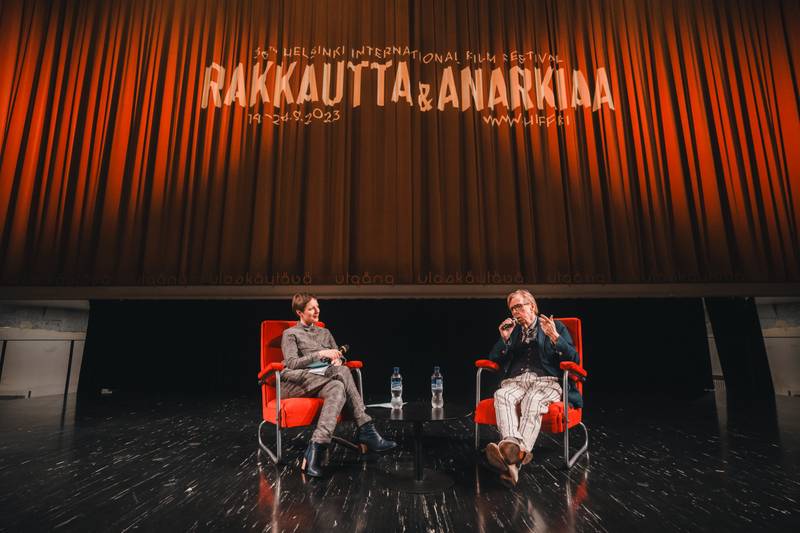

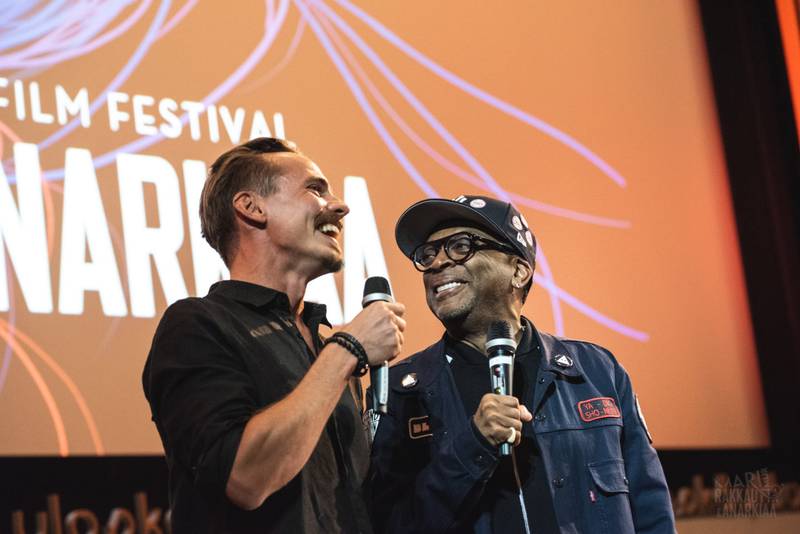

Q&A with Timothy Spall, 2023
Spike Lee & Jasper Pääkkönen, 2018
The audience is always the best thing. You work on the festival almost the whole year. And by the time the festival comes, the films have become like numbers and timetables, like figures of money, and then you don’t see the forest from the trees so much. Then the audience comes in, and they’re excited, baffled, or they get excited about a film that you never thought that they would get excited about. They are just so happy that the festival is beginning and all the discoveries that they can make. This trust that they are putting in you means that they want to spend this time and this money with you and are willing to take these risks with these films that, mostly, no one has heard of. It was heartbreaking during the COVID years when people had to sit apart, and they couldn’t even sit next to their friends. An endearing moment for me happened during the fundraising screening of All of Us Strangers last December. You could feel the wave of love and support in the room.
What’s the next step for you?
I’m just taking some time off now. I’m expecting a baby in the summer, so that’s my big next step. I don’t have anything lined up, but I would like to remain with film, but maybe look at it from a slightly different point of view and at a different pace.
